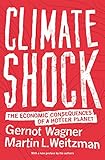Climate Shock : The Economic Consequences of a Hotter Planet / Gernot Wagner, Martin L. Weitzman.
Material type: TextPublisher: Princeton, NJ : Princeton University Press, [2016]Copyright date: ©2016Description: 1 online resource (272 p.) : 3 line illus. 5 tablesContent type:
TextPublisher: Princeton, NJ : Princeton University Press, [2016]Copyright date: ©2016Description: 1 online resource (272 p.) : 3 line illus. 5 tablesContent type: - 9780691171326
- 9781400880768
- 363.738/74 23
- QC903 .W34 2015eb
- online - DeGruyter
- Issued also in print.
| Item type | Current library | Call number | URL | Status | Notes | Barcode | |
|---|---|---|---|---|---|---|---|
 eBook
eBook
|
Biblioteca "Angelicum" Pont. Univ. S.Tommaso d'Aquino Nuvola online | online - DeGruyter (Browse shelf(Opens below)) | Online access | Not for loan (Accesso limitato) | Accesso per gli utenti autorizzati / Access for authorized users | (dgr)9781400880768 |
Frontmatter -- Contents -- Preface to the Paperback Edition -- Preface: Pop Quiz -- Chapter 1. 911 -- Chapter 2. 411 -- Chapter 3. Fat Tails -- Chapter 4. Willful Blindness -- Chapter 5. Bailing Out the Planet -- Chapter 6. 007 -- Chapter 7. What You Can Do -- Epilogue: A Different Kind of Optimism -- Acknowledgments -- Notes -- Bibliography -- Index
restricted access online access with authorization star
http://purl.org/coar/access_right/c_16ec
If you had a 10 percent chance of having a fatal car accident, you'd take necessary precautions. If your finances had a 10 percent chance of suffering a severe loss, you'd reevaluate your assets. So if we know the world is warming and there's a 10 percent chance this might eventually lead to a catastrophe beyond anything we could imagine, why aren't we doing more about climate change right now? We insure our lives against an uncertain future--why not our planet?In Climate Shock, Gernot Wagner and Martin Weitzman explore in lively, clear terms the likely repercussions of a hotter planet, drawing on and expanding from work previously unavailable to general audiences. They show that the longer we wait to act, the more likely an extreme event will happen. A city might go underwater. A rogue nation might shoot particles into the Earth's atmosphere, geoengineering cooler temperatures. Zeroing in on the unknown extreme risks that may yet dwarf all else, the authors look at how economic forces that make sensible climate policies difficult to enact, make radical would-be fixes like geoengineering all the more probable. What we know about climate change is alarming enough. What we don't know about the extreme risks could be far more dangerous. Wagner and Weitzman help readers understand that we need to think about climate change in the same way that we think about insurance--as a risk management problem, only here on a global scale.With a new preface addressing recent developments Wagner and Weitzman demonstrate that climate change can and should be dealt with--and what could happen if we don't do so--tackling the defining environmental and public policy issue of our time.
Issued also in print.
Mode of access: Internet via World Wide Web.
In English.
Description based on online resource; title from PDF title page (publisher's Web site, viewed 30. Aug 2021)


